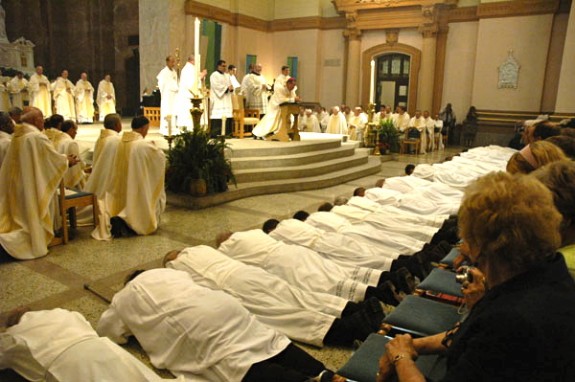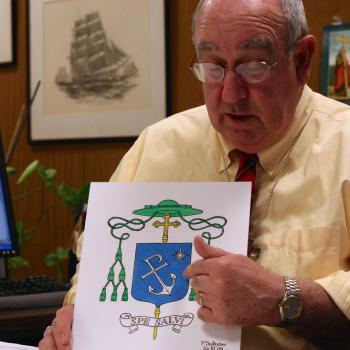The National Catholic Register has a good, long piece on the diaconate in its newest issue, marking the 45th anniversary of the restoration of the restoration of the order in the Latin Church:
Deacon Thomas Dubois, executive director of the National Association of Diaconate Directors, believes that the rapid growth of the permanent diaconate in the U.S. is a “work of the Holy Spirit.” He remarked, “The irony is that the Second Vatican Council fathers thought the diaconate would grow the fastest in third-world countries.”
A strength of the diaconate, he said, is that the deacon leaves Sunday Mass “to go into the world and the workplace as an active person of faith.”
Dubois noted that his neighbors in Lexington, Ohio, know him as “Deacon Tom” and view him as a representative of the Church. Ordained in 2002, he has devoted much of his diaconate work to prison ministry at Ohio’s Mansfield Correctional Institution. Inside the prison, Dubois counsels inmates, prays with them, instructs them in the tenets of the faith and otherwise is a friend to them. He remarked, “They’re appreciative of my efforts and say it makes a difference in their lives. In an environment where they’re cut off from their families and possibly an embarrassment to them, we treat them like human beings.”
Dubois believes being a deacon has given him the education and formation he needs to better minister to prisoners. Additionally, as a deacon, he is more closely identified with the work of the Church.
Many view deacons as “mini priests,” he said, with priests having the ability to do many more things. That’s not an accurate view, he said. The “fullness of holy orders” comes through the bishop, and he “disseminates his ministry through the priests and deacons.” Dubois continued, “We’re not competing. Deacons are not trying to be priests. We’re working in a complementary way with them.”
Deacon Gerald DuPont, director of the diaconate for the Archdiocese of Galveston-Houston, Texas, believes the restored diaconate to be a “tremendous value” to the nation’s Catholic parishes and institutions. The formation of deacons has “evolved and been refined” since 1967, he said, particularly with the release of instructions on the diaconate from the U.S. Conference of Catholic Bishops in 1983 and 2004, and from the Vatican in 1998.
Since being ordained a deacon in 1990, DuPont has worked in prison ministry, visited nursing homes, assisted at parishes and, today, teaches classes at St. Mary’s, the archdiocesan seminary in Houston. With nearly 400 active deacons, the third most in the country (Chicago is first, with 600), DuPont says there is still a need for more. In fact, the archdiocese recently did a survey of its priests, he said, and there were 183 requests for additional deacons.
He’s always ready to interview prospective candidates who would find the ministry of deacon as satisfying as he does: “I have found great happiness as a deacon. I have also found peace. God wants me to be here.”
Deacon Bob Puhala is director of the Institute for Diaconal Studies for the Archdiocese of Chicago. He was ordained by Cardinal Francis George in 1998 and has devoted much of his ministry to formation of prospective deacons.
“The permanent diaconate was an unexpected blessing of the Second Vatican Council,” he said. “No one anticipated that it would make such a big impact on ministry in the U.S.”












